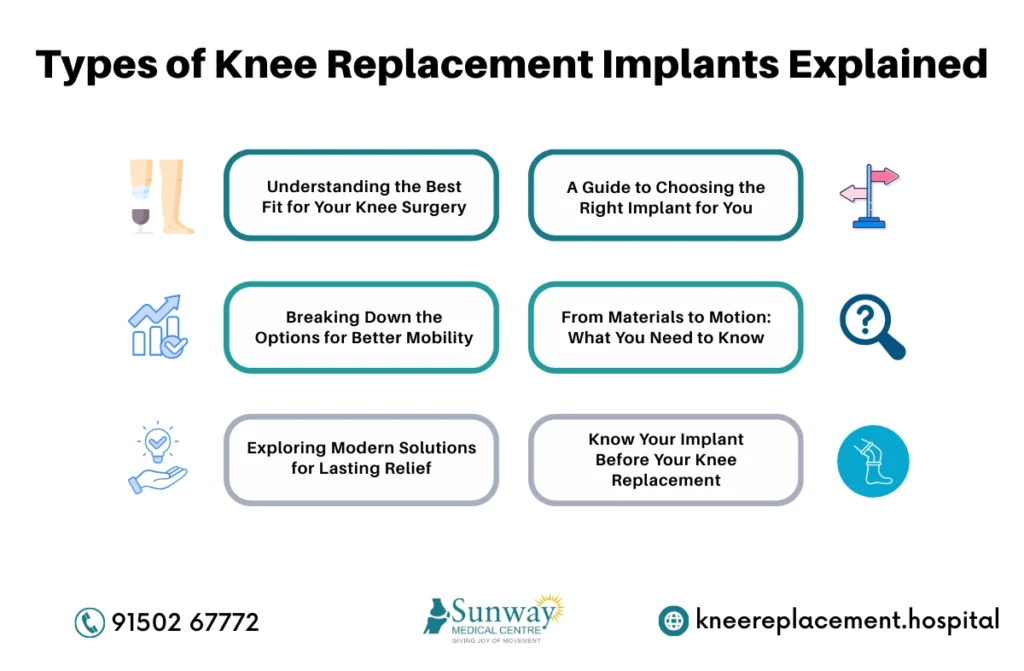Knee Replacement Implants
Knee Replacement Implants
Blog Article
Knee Replacement Implants are an essential part of knee replacement surgery, helping patients regain mobility and reduce pain. Whether due to arthritis, injury, or other conditions, many people require knee replacement to improve their quality of life. Understanding the different types, materials, and considerations of Knee Replacement Implants can help you make the best decision for your health.

What is Knee Replacement Surgery?
Knee replacement surgery, also called knee arthroplasty, is a procedure where damaged knee joint surfaces are replaced with artificial components. It is done when knee pain and stiffness make daily activities difficult.
Why Do People Need Knee Replacement?
- Severe arthritis (Osteoarthritis, Rheumatoid arthritis, Post-traumatic arthritis)
- Knee injuries or fractures
- Limited movement and chronic pain
What Are Knee Replacement Implants Made Of?
Knee Replacement Implants are made from durable materials to ensure long-lasting performance. These materials include:
- Metal (Titanium, Cobalt-Chromium): Strong and wear-resistant
- Plastic (Polyethylene): Reduces friction between metal parts
- Ceramic: Less common but offers excellent durability and biocompatibility
Choosing the best knee replacement implant depends on factors like age, activity level, and medical history.
Implant Components
Knee Replacement Implants consist of several key components that work together to replace the knee joint:
- Femoral Component: Covers the thigh bone (femur)
- Tibial Component: Covers the shin bone (tibia)
- Patellar Component: Replaces the kneecap
- Plastic Spacer: Helps in smooth movement between the metal parts
Each component plays a crucial role in ensuring the best knee replacement products function correctly.
Implant Considerations
Choosing the right implant depends on several factors:
- Age & Activity Level: Younger patients may need more durable implants
- Bone Quality: Determines whether cemented or uncemented implants are better
- Allergies: Some people react to metal implants, requiring ceramic or coated options
A surgeon will help determine the best knee replacement implant based on these considerations.
Implant Fixation
Knee implants need to be fixed securely to the bone. There are three main fixation methods:
- Cemented Fixation: Uses bone cement to secure the implant (most common)
- Cementless Fixation: Allows bone to grow into the implant for natural stability
- Hybrid Fixation: Combines both cemented and cementless methods
The right fixation method depends on bone health and surgeon preference.
Four Types of Knee Implants
There are different types of knee replacement implants, each designed for specific needs:
- Fixed-Bearing Implants: Most common, stable, and long-lasting
- Mobile-Bearing Implants: Allow more natural movement but require stronger ligaments
- Posterior-Stabilized Implants: Used when knee ligaments are removed
- Cruciate-Retaining Implants: Preserves natural knee ligaments for stability
Choosing from these types of knee replacement implants depends on age, bone strength, and lifestyle.
Implant Designs
There are several types of knee replacement implants, each designed to suit different patient needs, activity levels, and bone structures.
Common implant designs include:
- Posterior-stabilized implants – Ideal for patients with weak or damaged ligaments.
- Cruciate-retaining implants – Preserves more natural knee movement.
- Mobile-bearing implants – Allow for more flexibility and rotation.
- Gender-specific implants – Customized for the anatomical differences in men and women.
The best knee replacement implant should be chosen based on your age, weight, activity level, and bone quality. Your surgeon will guide you in selecting the best knee replacement products that offer durability and functionality.
Risks
Although knee replacement implants are generally safe, every surgical procedure comes with risks.
Possible risks include:
- Infection
- Blood clots
- Implant loosening or wear over time
- Nerve damage
Using the best knee replacement implant and the most suitable types of knee replacement implants helps reduce these risks significantly.
Surgeons recommend proven and tested best knee replacement products to ensure optimal outcomes. Regular follow-ups and rehabilitation are essential in maintaining the function of your knee replacement implants for many years.
Conclusion
best knee replacement products play a critical role in restoring movement and reducing pain. By understanding different types, materials, and considerations, you can make an informed choice. If you’re considering knee replacement, consult your doctor to find the best knee replacement implant for your needs. Report this page